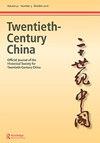"This Absolutely Is Not a Hui Rebellion!": The Ethnopolitics of Great Nationality Chauvinism in Early Maoist China
IF 0.4
Q1 HISTORY
引用次数: 0
Abstract
Abstract:Through the 1950s, the Chinese Communist Party (CCP) considered nationality disunity to be a product of "great Han chauvinism." But what happens when history's bad guys are not Han? In parts of China's Northwest, the party identified Hui Muslim elites as the main agents of nationality exploitation and Tibetans as their principal targets. It therefore declared Tibetans of all classes to be victims of nationality exploitation and ordered that "good" Muslims be distinguished from "bad," a task made more urgent by a string of uprisings that engulfed several Muslim-majority areas of the Qinghai-Gansu Highlands from 1949 to 1953. While echoes can be found in the late Qing state's response to Muslim rebellion, this article argues that the CCP's approach to the "Hui question" must be viewed as part of a particular practice of minoritization and a framework for conceptualizing the new socialist nation-state that would leave Muslims and other non-Han communities susceptible to majoritarian-state violence.“这绝对不是回乱!”:毛主义早期伟大民族主义的民族政治
摘要:20世纪50年代,中国共产党认为民族不统一是“大汉族主义”的产物。但当历史上的坏人不是汉族时,会发生什么?在中国西北部的部分地区,该党将回族穆斯林精英视为民族剥削的主要推动者,将藏族视为主要目标。因此,它宣布所有阶层的藏人都是民族剥削的受害者,并下令区分“好的”穆斯林和“坏的”穆斯林,1949年至1953年席卷青藏高原几个穆斯林占多数地区的一系列起义使这项任务变得更加紧迫。虽然在晚清政府对穆斯林叛乱的回应中可以找到回声,但本文认为,中共处理“回族问题”的方法必须被视为少数民族化的特殊实践的一部分,以及概念化新社会主义民族国家的框架,这将使穆斯林和其他非汉族社区容易受到多数国家暴力的影响。
本文章由计算机程序翻译,如有差异,请以英文原文为准。
求助全文
约1分钟内获得全文
求助全文

 求助内容:
求助内容: 应助结果提醒方式:
应助结果提醒方式:


